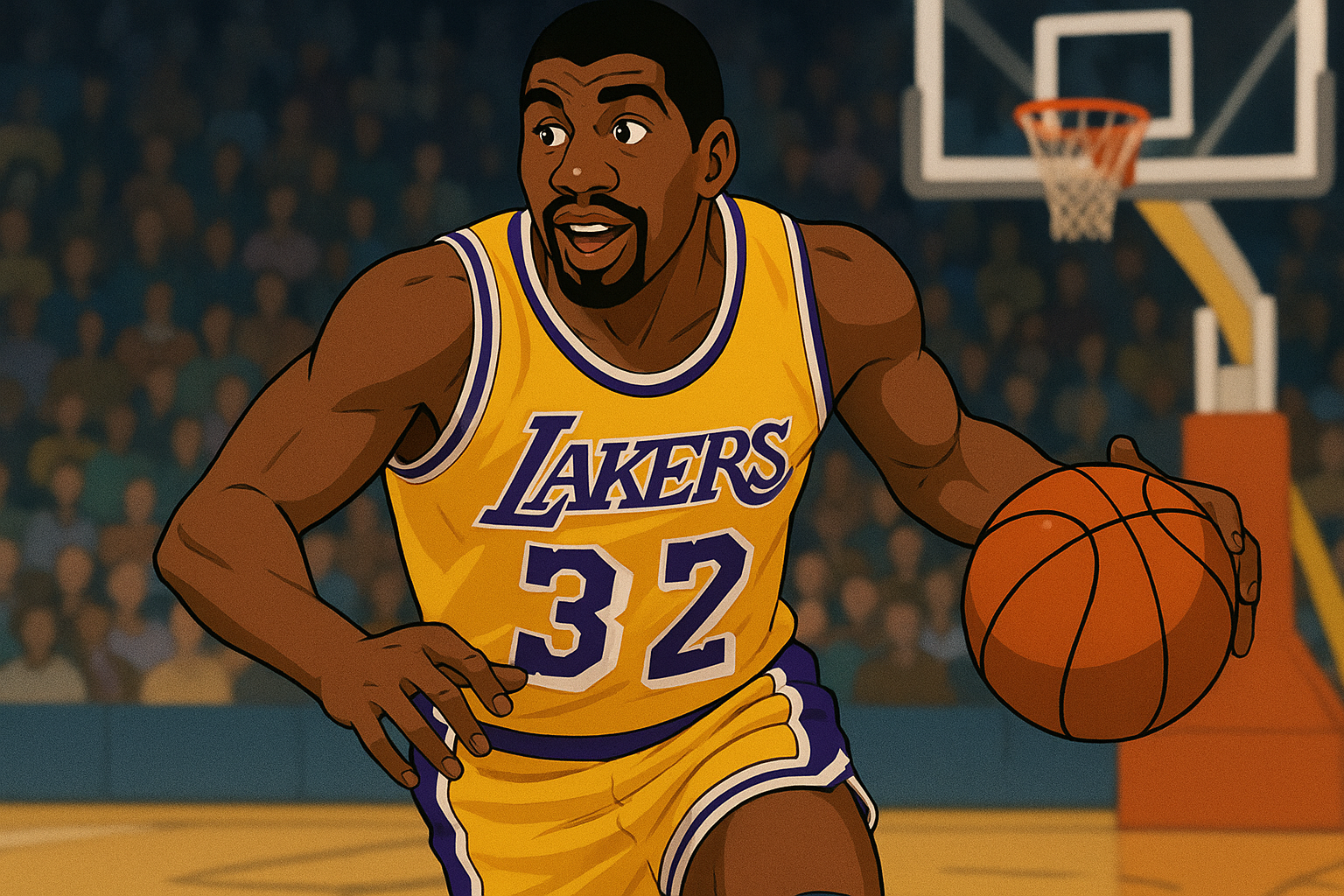Table of Contents
Table of Contents
Today, August 14, 2025, marks the 66th birthday of Earvin "Magic" Johnson Jr., one of the most transformative figures in basketball history. Born in Lansing, Michigan, in 1959, Magic's journey from a hardworking Midwestern kid to a global superstar is nothing short of inspirational. As fans around the world, including on X (formerly Twitter), flood social media with tributes—ranging from heartfelt messages to highlight reels—it's the perfect time to reflect on his illustrious career, unbreakable spirit, and enduring impact. From leading the "Showtime" Lakers to five NBA championships to his trailblazing work in business and activism, Magic's story exemplifies greatness on and off the court.
Early Life and the Spark of Magic
Magic Johnson grew up in a large family in Lansing, Michigan, with parents who instilled a strong work ethic—his father worked at General Motors, and his mother was a school janitor. Basketball became his passion early on, idolizing legends like Bill Russell. At Everett High School, where he was bused as part of desegregation efforts, Magic earned his nickname after a sophomore game where he posted a triple-double: 36 points, 18 rebounds, and 16 assists. By his senior year, he averaged 28.8 points and 16.8 rebounds, leading his team to a state championship.
Choosing to stay close to home, Magic attended Michigan State University. There, he averaged 17.1 points, 7.6 rebounds, and 7.9 assists over two seasons. His crowning college achievement came in 1979, when he led the Spartans to an NCAA championship against Larry Bird's Indiana State in what remains the most-watched college basketball game ever. Magic was named the Final Four's Most Outstanding Player, setting the stage for a legendary rivalry with Bird that would define the NBA in the 1980s.
NBA Dominance: The Showtime Era
Drafted first overall by the Los Angeles Lakers in 1979, Magic immediately revolutionized the game with his no-look passes, infectious smile, and unparalleled court vision. In his rookie season, he stepped up in Game 6 of the NBA Finals against the Philadelphia 76ers, playing center in place of an injured Kareem Abdul-Jabbar and dropping 42 points, 15 rebounds, and 7 assists to clinch the championship—earning Finals MVP honors at just 20 years old.
Over 13 NBA seasons (primarily with the Lakers, plus brief international stints), Magic amassed staggering stats: 17,707 points (19.5 per game), 6,559 rebounds (7.2 per game), and 10,141 assists (11.2 per game)—the highest assists-per-game average in league history.
- He led the league in assists four times and steals twice, recording 138 triple-doubles (fourth all-time) and a playoff record 2,346 assists.
- His accolades are endless: five NBA championships (1980, 1982, 1985, 1987, 1988), three NBA MVPs (1987, 1989, 1990), three Finals MVPs (1980, 1982, 1987), 12 All-Star selections, and nine All-NBA First Team nods.
- Magic also won All-Star MVP in 1990 and 1992, and as part of the 1992 "Dream Team," he claimed Olympic gold, completing basketball's Triple Crown (NCAA title, NBA title, Olympics).
The "Showtime" Lakers, fueled by Magic's fast-paced style, not only won titles but also revitalized the NBA's popularity, turning games into must-see entertainment.
Overcoming Adversity: The HIV Announcement and Comebacks
In November 1991, Magic shocked the world by announcing he had tested positive for HIV, retiring immediately to focus on his health. This moment, later named one of ESPN's most memorable in sports history, shifted global conversations about HIV/AIDS, emphasizing that it could affect anyone.
- Despite the diagnosis, Magic returned for the 1992 All-Star Game, scoring 25 points and earning MVP amid standing ovations. He played in the Olympics that summer but retired again due to controversy.
- In 1996, he made a final comeback, averaging 14.6 points, 6.9 assists, and 5.7 rebounds in 32 games before retiring for good.
- Every birthday since 1991 has been a testament to his resilience—fans today on X echo this sentiment, calling it a "blessing" that he's still thriving.
Post-Career Success: Business Mogul and Philanthropist
Magic didn't fade away after basketball; he built an empire. Founding the Magic Johnson Foundation in 1991 for HIV/AIDS awareness, he hosted charity events like "A Midsummer Night's Magic," raising millions.
- As a businessman, his Magic Johnson Enterprises is worth $700 million, with ventures in urban communities including Starbucks franchises, movie theaters, and restaurants.
- He's a co-owner of multiple sports teams: the Los Angeles Dodgers (2020 and 2024 World Series winners), Los Angeles Sparks (2016 WNBA champions), Los Angeles FC (2022 MLS Cup winners), Washington Commanders (NFL), and Washington Spirit (NWSL).
- He briefly coached the Lakers in 1994 and served as their president of basketball operations from 2017 to 2019.
A Lasting Legacy
Magic Johnson is universally regarded as one of the greatest players ever—ranked No. 4 in ESPN's all-time NBA list, inducted into the Hall of Fame in 2002, and named to the NBA's 50 Greatest Players (1996) and 75th Anniversary Team (2021).
- The NBA honored him by naming the Western Conference Finals MVP award after him in 2022. In 2025, he received the Presidential Medal of Freedom, adding to honors like the Muhammad Ali Legacy Award and a Hollywood Walk of Fame star.
- On X today, posts from fans and accounts like the Lakers official page celebrate him as a "legendary" figure and "the greatest complete player of all time," with tributes highlighting his triple-doubles and Showtime magic.
- His influence extends beyond stats; Magic showed us how to lead with joy, overcome obstacles, and give back.
Happy Birthday, Magic! Your magic continues to inspire generations. Here's to many more years of greatness.


